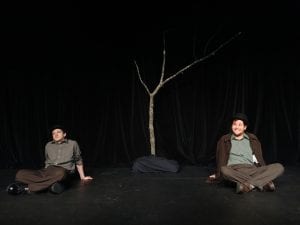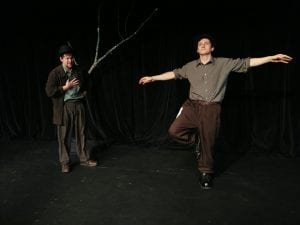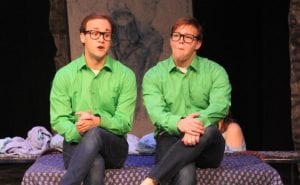Long Wait Over for “Waiting for Godot” at Moline’s Black Box
The 1953 Samuel Beckett classic “Waiting for Godot” has had a long wait for its premiere Thursday at Moline’s Black Box Theatre. But it’s perfect for a pandemic-plagued 2020.

Mike Schulz, an Augustana alum, is a Q-C theater veteran who is directing “Godot.”
Directed by local theater veteran Mike Schulz (an Augustana College alum), he started rehearsals in May, originally as a partnership between QC Theatre Workshop and Mississippi Bend Players. A plan to do the mainly two-person play outside at a pavilion behind Brunner Theatre Center was later shelved, and it’s now going up independently at the small Black Box with a maximum audience of 26 – masks are required – and actors wearing clear face shields.
“Godot” stars two 2020 Augie grads, close friends for four years — Peter Alfano as Estragon and Tristan Odenkirk as Vladimir — and this is Alfano’s first involvement in a Quad-Cities theatre production outside of college.
“It was strange, because at the very beginning, it was a project we didn’t know if it was going to happen or not,” he said Tuesday. “We were meeting up every once in a while, working on some scenes, for the fun of it at the time. We always knew, because it’s Mike Schulz, he was gonna get it up. He was gonna find a way.”
Alfano performed a lot while at Augie, playing roles such as D’Artagnan in “The Three Musketeers,” Reverend John Hale in “The Crucible,” and Philip Brent / Frederick Fellows in “Noises Off.”
In his program bio, he said he’s excited to finally put this production together for everyone to see, as the journey “has been a long but amazing one.”
“I love the idea of going outside, but once we got in the Black Box, it just seemed meant to be,” Alfano said of the 60-seat theater at 1623 5th Ave., Moline. “It’s a really nice stage; it’s perfect for how we’re staging it, and it’s nice to be inside when it’s gonna be cold out, you know?”
Schulz’s dream cast had included Cait Bodenbender as Pozzo and Amelia Fischer as Lucky, with Cait’s 13-year-old son Josef as the boy. Jackie McCall, the MBP producing artistic director, led a Zoom first reading and she thought it was a great idea for the Augie pavilion.
Schulz knew he could stage it with characters at least six feet apart. Only Josef got to stay among the minor roles, though.

“Waiting for Godot” will be at Moline’s Black Box this weekend and next.
“The Beckett estate refuses to grant you the rights if you have any women in the show,” Schulz said. “They are adamant about that, so casting Cait and Amelia was no longer able to happen. They were incredibly understanding.”
Bodenbender became assistant director, they started rehearsing outdoors without Pozzo and Lucky. “It was going great; it was playing like a dream,” Schulz said of the leads. “Those guys play off each other unbelievably beautifully.”
They hoped to stage it at the pavilion in September. They met regularly over the summer, and had a challenge recasting the two roles, since they didn’t have firm dates, Schulz said.
By July, Lora Adams started doing shows at the Black Box again (the first Q-C theater in the area to stage indoor productions), with “Turn of the Screw,” and “The 39 Steps” in August. Schulz was impressed with the clear face shields.

Peter Alfano, left, and Tristan Odenkirk as vagabonds Estragon and Vladimir in the Samuel Beckett classic, “Waiting for Godot.”
“I saw ‘The 39 Steps’ and by God, within 30 seconds, I forgot all about them,” he said. “In certain light especially, it looks like they’re not wearing masks at all. It’s brilliant.”
By the end of August, once they canceled the football season at Augie, Schulz said they wouldn’t allow theater, “for totally understandable reasons,” he said. “There were no hard feelings there.”
Schulz contacted Adams about doing it at the Black Box, and she agreed. State of Illinois regulations say indoor theaters must operate at the lesser of 50 guests or 50% overall theater or performance space capacity. This does not include cast, crew or theater staff. Outdoor seated venues should operate at 20% of overall theater or space capacity.
“Now we have a place, indoors, which is astonishing to us,” Schulz said. “It’s coming together and we could not be more thrilled. It feels like the right place, the right time, and it’s tragic and heartbreaking and it’s also hysterical.”
“It’s not like we haven’t been living ‘Godot’ every day of our lives for the past seven months,” he said. “It absolutely feels like it.”
The use of face shields has gone well, the director (who last helmed “Venus in Fur” at QCTW in 2018) said. “Everyone is handling it with amazing humor. No one’s passed out. They’re doing great in them. Lora had genius inspiration. And that might be the way theater has to be for the foreseeable future, if you don’t have a space as big as Circa’s, for instance. I think that’s probably the only way theater is gonna happen for a while.”

Tristan Odenkirk (pictured with Amy Nicholson) starred in Mississippi Bend Players’ “Biloxi Blues” in summer 2019.
“It’s become second nature for sure, but at the beginning, having a face shield in front of you while you’re trying to act is different,” Alfano said. “It causes a little bit of an echo, coming right back at you, ‘cause you’re just talking into a plastic screen pretty much.
“For me, after the first two lines, I forget it’s there. I’ve been told by anyone who’s been in the audience that they forget about it right away. So it’s worth it, and it doesn’t seem to cause a problem.”
Odenkirk – whose uncle is famous TV actor Bob Odenkirk and has worked often with Schulz on stage – agreed the plastic face shields will not be distracting for audiences, but are challenging for actors.
“It’s really incredible how well they’re designed, to make it look like you’re not really wearing anything. But for us, it blocks air flow,” Tristan said. “There’s no way around it.”

Tristan Odenkirk, Corinne Johnson, and Mike Schulz in “The Goat, or Who Is Sylvia?” at the QC Theatre Workshop last fall.
“It’s really hard to do all this physical comedy without being able to breathe all the time,” he said. “It’s taken getting used to, but it’s all for the better and I think it’s worth it.”
Odenkirk’s recent acting credits include Doug in “Gruesome Playground Injuries” and Billy in “The Goat, or Who Is Sylvia?,” both last fall at QCTW in Davenport. He’s sound designer for “Waiting for Godot,” as he did for the Mississippi Bend Players’ 2019 production of “The Santaland Diaries” and the currently running “Savannah Sipping Society” at Circa ’21.
He and Schulz had major roles in MBP’s “Brighton Beach Memoirs” and “Biloxi Blues” – with the third in the Neil Simon trilogy (“Broadway Bound”) canceled with this past summer’s MBP season.
An apt metaphor for 2020
In “Waiting for Godot,” wandering vagabonds Vladimir and Estragon wait by a barren tree to meet with Mr. Godot, an enigmatic figure in a world where time, place, and memory are blurred, according to a synopsis at theblackboxtheatre.com.
The nondescript tramps hope Godot will change their lives for the better. But instead of enjoying an audience with Godot, the two encounter the eccentric travelers Pozzo and Lucky, as well as a young boy who bears urgent news.
Between its scenes of “riotous slapstick and tender anguish,” “Waiting for Godot” is called “a hilarious, heartbreaking, ultimately hopeful tale

Peter Alfano, right, and Tristan Odenkirk in “Waiting for Godot” at Black Box Theatre.
of a friendship that refuses to perish,” the synopsis says. The London Evening Times has described it as “one of the most noble and moving plays of our generation…with phrases that come like a sharp stab of beauty and pain.”
Alfano and Odenkirk say the piece is so relevant to today’s precarious times, and they play it as the life they had – good friends from college waiting for their adult life to start.
“It was perfect – just two college kids who got stuck together in the quarantine and they’ve been roommates forever, and it feels like it’s never gonna end,” Alfano said, noting he and Odenkirk were never literally roommates, but close in theater.
“There are certain parts of it that are really light-hearted and there are parts that are super sad and dramatic in the show, and I think it’s gonna relate to a lot of people in the audience,” he said. “At the end, hopefully they take away, there’s gonna be a happy ending to this, as long as you have somebody with you, you can get through anything.”
“It’s so perfectly constructed; it’s a play in which nothing happens, twice,” Odenkirk said. “And that was the reality of our situation a couple months ago. Leading up to the election, obviously, it’s been a pretty eventful couple weeks. But when this whole pandemic started, it was just us trying to stay in our home, and everything was just the same every day.”
“It’s such a hard show to read, because it’s so dense and it’s so conversational and it’s quick and it’s witty,” he said. “But once you see it staged, it clicks and once you hear the words being said aloud, it clicks. This is exactly what I was living. I mean, it’s that, is it Tuesday or Wednesday and does it really matter?”
“What time of day is it and does that change anything? Does that matter at all?” Odenkirk asked. “All of a sudden, it’s night and you wait until the next day.”
“I think it’s a common enough theme, because it’s something none of us had ever really experienced before.”

Tristan Odenkirk, left, and his brother Keenan, in Mississippi Bend Players’ “Beginner’s Luck” in summer 2018.
In the play, it’s hard to know if the two men are friends, or a couple, or just vagrants who bumped into each other, he noted.
Estragon forgets things, and Vladimir reminds him, and that’s their relationship, Odenkirk said. “Estragon needs to be reminded and Vladimir needs someone to remind,” he said. “There’s a beautiful little trinket of friendship in that, that I think people will really click with especially now.”
“In our production, it’s that friendship of, when the pandemic starts, you have that little pod of people, two or three people you’re allowed to see every day, and that became what this show was,” he added. “This idea of, as long as I have this other person, it doesn’t really matter how long I’m waiting or how bored I get, because we have each other to spend the time with.”
“Peter is that right person, I’ve acted with multiple times before,” Odenkirk said. “We have pretty great chemistry and it feels pretty natural.”
The 2020 grads (like other students nationwide) had to finish their spring semester online and didn’t get an in-person commencement (which will be combined with the 2021 ceremony).
When Odenkirk graduated, he was dead set on moving to Chicago, where his brother Keenan (also an actor and ’18 Augie alum) lives.
“I was going to start auditioning, get a job, and all of that got shut down,” Tristan said. “When all of your future plans are shut down, and your old life comes to an end, what do you do then? That’s where we were at. None of us had any idea what to do.”
“It was just passing the time, and Mike saw that,” he said of Schulz. “That resonated with him; it touched him in a way, and he said, what if we did this play in the guise of these college roommates who had this future and lost it, but they still have each other?
“They hadn’t planned on living together this long. They were gonna part ways and live their lives, but here they are, still waiting for good

Black Box Theater in Moline has kept its performance space alive with scaled-down shows during covid.
news,” Odenkirk said. “Still waiting for someone to come along and say they can have everything back. They’re not gonna be like this forever.”
That sentiment should strike a chord with any other sentient being who’s had their life stuck in amber during the past seven months, waiting for some kind of normal.
Odenkirk now works as an administrative assistant for NAI Ruhl Commercial Co. Alfano lives in Knoxville, Ill., about 45 minutes south of the Quad-Cities, where he works for his family’s pizza restaurant. Relatives of his own Alfano’s Pizza in Rock Island, part of his family’s chain of restaurants in western Illinois.
“I’ve always been a performer, I think,” he said of loving theater. “Just being able to play a different person – someone I don’t have much experience in life, either who struggles or someone who can do slapstick. And making an audience react in some way, whether it’s a comedy and they’re laughing, or drama and they feel for whatever character I’m playing. There’s something about that, that I just love. I also love watching theater, because I feel the same way as an audience member.”
A two-person show like “Godot” is ideal, giving them lots of stage time.
“This show is perfect because it’s two-person lead, so Tristan and I are always on stage, and we already have such good chemistry,” Alfano said. “You can see it in the show. It’s so awesome to work with Tristan this close, and to bring in other friends to come in and help push the story forward, it’s all great. I think this cast is great and I really enjoy the stage time and working with everyone that’s sharing the stage with me.”
The last live play he was in was “Noises Off” last fall at Brunner.
“Theater became an unknown passion of mine, that I figured out my freshman year. I was doing a few shows every now and then at Augustana,” Alfano said. “Going on a little break felt weird. It wasn’t exactly a planned break, obviously, because of Covid. But, it’s really, really nice, even back in May when it was Mike Schulz, Tristan Odenkirk and I, to do some acting and performing.
“Now, it’s incredible we’re going to be performing in front of an audience with this amazing show we’ve worked so hard on. It’s nice to come back to it.”
Schulz is amazed as well, at his young actors’ prowess and range.
“Even though he’s decades younger than the middle-aged character he’s playing, I knew from the start that Tristan was going to be a perfect Vladimir, and he is,” Schulz (who co-starred as the animal-loving husband in “The Goat”) said.
“Tristan is one of the funniest stage comics I’ve ever worked with – he’s hilariously inventive both verbally and physically – so it was clear that he would score his laughs,” the director said. “But he’s also capable of being truly heartbreaking on-stage without there being anything forced about his performance. He just lives in the moment and is honest in the moment.
“I’m pretty convinced that there’s no role Tristan couldn’t knock out of the park,” Schulz said. “He’s so talented it’s almost annoying.”
He was a fan of Alfano’s stage work for years before even meeting him.
“He was so polished and so controlled, yet always so real – you never caught him ‘acting.’ He was just being,” Schulz said. “And it didn’t matter if it was a dramatic role in The Crucible or a slapstick role in Noises Off; he brought the same levels of commitment and truth to each.
“I almost think Peter was born in the wrong decade, because he really could have been an astonishing silent-comedy star along the lines of

Peter Alfano and Amy Nicholson in Augustana College’s “Noises Off” in September 2019.
Buster Keaton or Charlie Chaplin – those legends who could make you laugh and cry in the same breath,” he said. “Then again, silent pictures wouldn’t have let us hear Peter speak, and his deadpan readings as Estragon are phenomenal.”
A reunion of an “Anarchist” cast
This “Godot” also is special since it reunites four Augie guys – the adult cast is rounded out by Brandon Smith (another 2020 grad) and current senior Jarod Kovach as Pozzo and Lucky.
All four of them were in Augustana’s “Accidental Death of an Anarchist” in 2018, which Odenkirk said was their favorite college show. Done at the Blackbox Theatre at Brunner, the internationally recognized play is by Dario Fo, recipient of the 1997 Nobel Prize in Literature.
The play is a farce based on the real-life events surrounding Italian railwayman and anarchist Giuseppe Pinelli, who fell – or was thrown – to his death from the fourth floor window of a Milan, Italy police station in 1969.
“It was just such an incredible show – a farcical joy to perform every single night,” Odenkirk said. “People loved it; we sold out every single night. And it just felt less like a play and more like a really fun event, that had grit to it, and was weird and different. That’s the kind of energy we’ve been trying to re-create with ‘Godot.’”
The performances at Moline’s Black Box (1623 5th Ave.) will be at 7:30 p.m. Oct. 22 to 24 and Oct. 29-31. Tickets are $13 Thursdays, and $16 for the rest, available at theblackboxtheatre.com.









